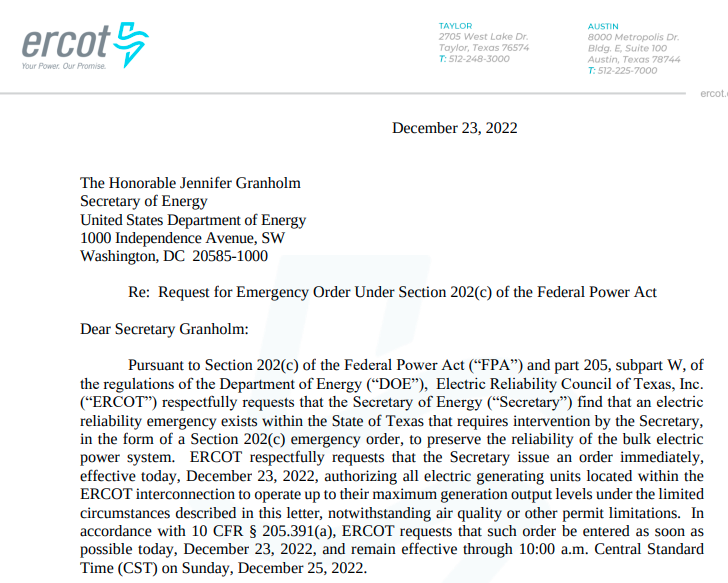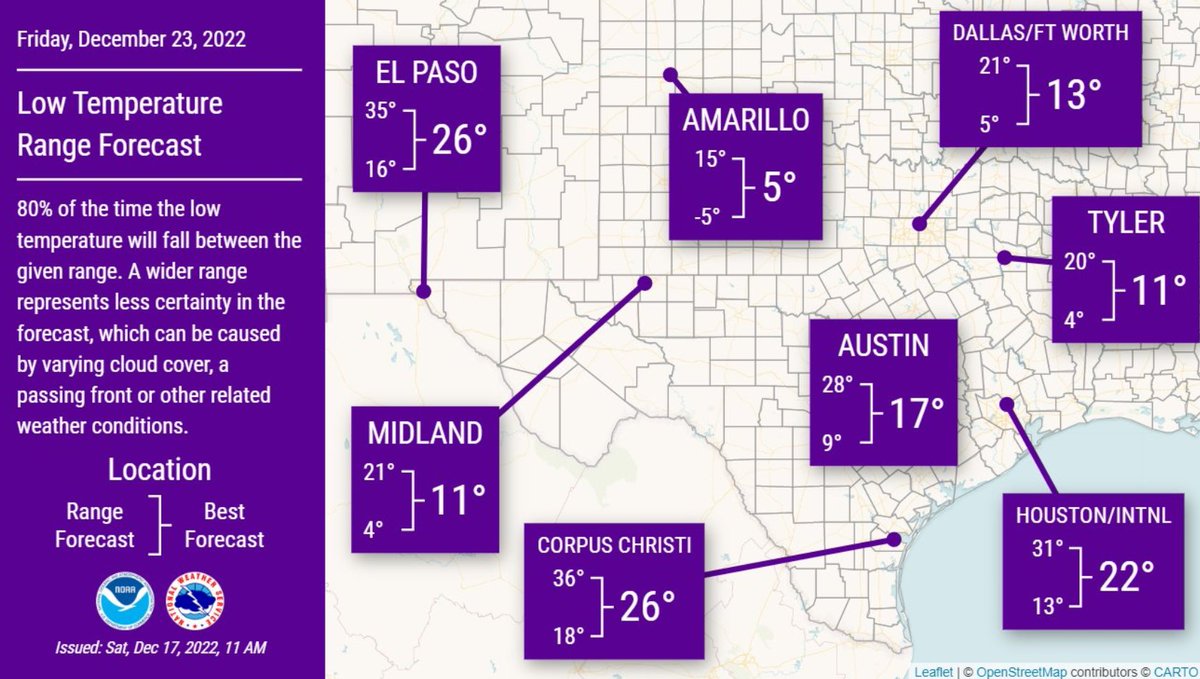
A few #TXenergy takeaways as we thaw:
1) The grid's still vulnerable. #ERCOT CEO requested an emergency order yesterday, writing ERCOT “may not be able to avoid the need to curtail firm load.” That is, outage risk was real. He cited “natural gas delivery limitations.” #txlege 1/
1) The grid's still vulnerable. #ERCOT CEO requested an emergency order yesterday, writing ERCOT “may not be able to avoid the need to curtail firm load.” That is, outage risk was real. He cited “natural gas delivery limitations.” #txlege 1/

Heard about this from @shelbywebb, see below. The language from ERCOT CEO Vegas was clear: "the loss of power to homes and local businesses in the areas that may be affected by curtailments presents a far greater risk to public health and safety."
houstonchronicle.com/business/energ…
houstonchronicle.com/business/energ…
2) Communications are still terrible. Not one state official held a press conference or did a media availability to inform the public of this letter or why it was needed. This from @adelauchida was a common experience among journalists yesterday.
#txlege
#txlege
https://twitter.com/adelauchida/status/1606361388498157591?s=20&t=vkCD_n6ITDoerXs8PetleA
3) We're lucky. Had there been snow/ice and/or if temps had been ~5° colder, it's likely there'd have been outages. We’ve got a ways to go before anyone can guarantee a reliable grid. That should not be surprising. Uri exposed massive problems that can't be fixed quickly.
4) #ERCOT's demand forecasting is dangerously bad. Again, wind bailed us out but a forecast miss of 23% imperils the grid—and us. ERCOT & PUCT need to heed NERC's recommendation to understand heating demand better—and increase efficiency! #txlege
https://twitter.com/douglewinenergy/status/1606162941291765760?s=20&t=vkCD_n6ITDoerXs8PetleA
5) Thermal plants still have problems. ERCOT CEO Pablo Vegas highlighted in his note to Secretary Granholm that 11GW of thermal plants were offline, more than expected in the ERCOT's winter assessment. (DOE quickly granted the state’s request btw, cooperative federalism ftw!)
6) The grid is a system and we need the parts of the system to work well together. Thursday night, #wind carried us. Friday, #solar came on strong, picking up for slowing winds. Friday night, gas was the workhorse. (Nukes were conistent through it all)... (cont.) #Txenergy
Too many policy fights devolve to renewables bad, gas good, or vice versa. Stop it. Please.
All energy sources have benefits and drawbacks. The work is to integrate them well so we get what’s good about each of them & reduce the risks and negative aspects of each. #txlege
All energy sources have benefits and drawbacks. The work is to integrate them well so we get what’s good about each of them & reduce the risks and negative aspects of each. #txlege
As TVA, ISO-New England, & PJM are all experiencing today, natural gas and coal have significant limitations. Fossil fuels particularly struggle in the wintertime when they are too often not dispatchable as advertised. We have way too much evidence to ignore this. #energytwitter
So what should we do?
First, here’s what we shouldn’t do: redesign the market with a goal to direct more money at gas & coal plants. FERC & NERC specifically cited dependence on gas in the Winter Storm Uri report as a weakness (p. 48). And generators are making money... (cont)
First, here’s what we shouldn’t do: redesign the market with a goal to direct more money at gas & coal plants. FERC & NERC specifically cited dependence on gas in the Winter Storm Uri report as a weakness (p. 48). And generators are making money... (cont)
Clearly we need gas plants on the system. And gas generators were rewarded in the market as >$1.5b changed hands in the day ahead and ancillary markets over a 72 hour period.
That’s a lot of incentive to make sure those plants are ready when needed. #txenergy
That’s a lot of incentive to make sure those plants are ready when needed. #txenergy
Too many generators cry poverty in ERCOT but I listen to their quarterly earnings calls. They're making money. The capacity market constructs proposed by big generators NRG & Exelon are primarily about their profits not reliability. There's plenty of money in the market. #txlege
So what do we do for greater reliability? First, we need better regulation of #gas. As one exmaple, the problems experienced by Atmos customers who lost heat are inexcusable. This should be investigated to make sure Texans are safe in future cold snaps.
https://twitter.com/douglewinenergy/status/1606440158177501186?s=20&t=vkCD_n6ITDoerXs8PetleA
Second, we need #energyefficiency. This is absolutely necessary. We’ll have these problems forever until we aggressively address this. Not some incremental changes either. Full on mobilization to add insulation and replace inefficient heat. More here: douglewin.substack.com/p/2022-cold-sn…
We need more storage, both short & long duration. We need to know if the PUCT's "conservative operations" wore down gas plants increasing unit outages during the cold snap. And ERCOT/PUCT needs to stop RUC-ing units on days when they're not needed so they can get maintenance.
We need to stop thinking of these events as high impact/low probability events. They're high impact medium probability events now, and the probabilities are going up every day. I hate to say, it's a hard reality to accept but extremes are the new normal. We need to adapt. #txlege
Finally, we need flexibility, resources like storage & demand flexibility that can respond in a variety of situations.
We need flexible grid resources AND flexible thinking. Too many in this space are too rigid. There are not silver bullets. No one thing is the thing. #txlege
We need flexible grid resources AND flexible thinking. Too many in this space are too rigid. There are not silver bullets. No one thing is the thing. #txlege
This is complicated stuff. We need to learn from & listen to a range of voices to figure out how to increase reliability, resiliency, & affordability. Flexibility solves a lot of problems on the grid AND in policy discussions. Thanks for reading. Enjoy the warmth this week!
End🧵
End🧵
• • •
Missing some Tweet in this thread? You can try to
force a refresh











